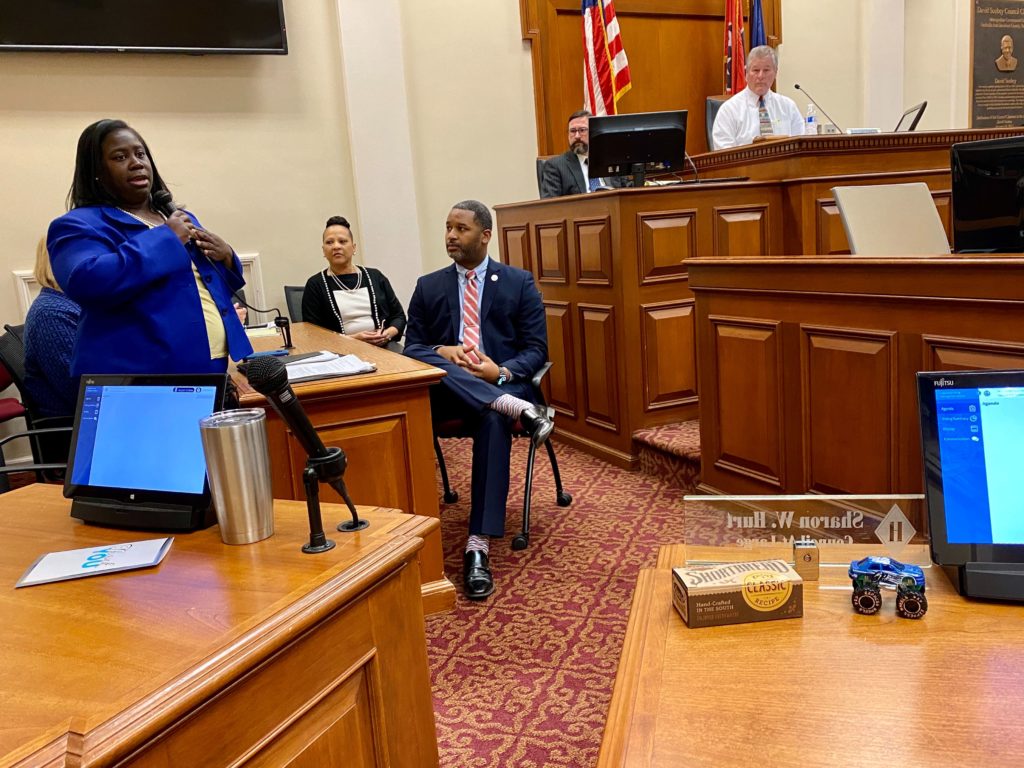
Nashville’s Juvenile Court is making major management changes after four teens escaped from its detention center late last year.
The CEO of the company that runs the facility told Metro Council members Thursday night that he was “ashamed” and that they’ve “tightened the ship.” But some council members say they’re still not convinced it’s enough.
Negligence. Egregious issues. Security lapses.
Those were just a few of the choice words used to describe the chain of events that allowed four teens to break out of the juvenile detention center Nov. 30.
At Thursday’s public safety committee meeting, council members, law enforcement officers and representatives from the Juvenile Detention Center detailed the growing list of oversights that have recently come to light through multiple internal and external investigations into the circumstances surrounding the escape.
But as one council member after the next drilled her with questions, Juvenile Court Judge Sheila Calloway didn’t try to shift the blame.
“It was heartbreaking to know that we were in part responsible for such a traumatic incident that put the members of our community at risk,” Calloway said. “We take responsibility for everything that led up to this. And we are definitely making sure that nothing like this, to this magnitude, that we can control, happens again.”
The detention center’s contractor, Youth Opportunity Investments, said its entire staff has been retrained and a monitor is now on site every day. The private company has also increased its starting wage for employees from $12 an hour to $15, in the hopes of recruiting more qualified employees.
Calloway said staff recruitment and retention has been a struggle for YOI and that employee oversights caused the escape.
“It’s hard to get people to work in a juvenile facility like the one that we run that deals with the youth who have made probably the worst decisions of their life and have a lot of behavioral issues, have a lot of mental health issues, have a lot of adverse childhood experiences that they’re dealing with, dealing with a lot of trauma,” Calloway said. “It’s difficult to get people — committed people — to really want to put in the hours to work with them day in, day out … especially if the salary is not very high.”
But it wasn’t just staffing issues that led to the teens’ escape — and the 13-day search that followed.
Several council members pointed out discrepancies between YOI’s employee policy, which allows staff to search for escapees on their own, and the company’s contract with Metro, which requires them to immediately call police for help. Juvenile Detention Center staff waited 42 minutes to call 911.
They also raised questions about an electric surge in March 2018, which disabled several of the detention facility’s cameras. Judge Calloway said juvenile court staff weren’t aware of the scope of the damage until the breakout.
In its current condition, Calloway said, the Juvenile Detention Center isn’t equipped to keep its staff, youth or the surrounding community as safe as it should.
“There’s absolutely no doubt that this was really because of employee error and security errors,” Calloway said. “But the design and the makeup of the building did not help that at all.”
Calloway said the court conducted a building study about three years ago, which uncovered multiple security risks in the 26-year-old facility. But Metro has yet to allocate the funding she requested to construct a new juvenile courthouse.
Davidson County Sheriff Daron Hall urged council members to use this “crisis” as an opportunity to reevaluate how they invest in public safety.
“It’s unfortunate,” he said. “I’ve been here 30 years. The only time I’ve ever heard council members this interested in detention is when something goes horribly wrong.”
Hall said corrections staff — both at his government-run jails and at the Juvenile Detention Center’s privately operated facilities — are underpaid to do jobs “none of you would go do.”
“And as long as you don’t hear about us, we’re doing good, you think,” Hall said. “And I just ask you to take the time under the crisis to appreciate how difficult this work is.”
Hall added that he was “uncomfortable blaming any one entity” for the escape.
“Take a look at what happened. Let’s go try to address it, make sure it doesn’t happen that way again,” he said. “But I promise you, whoever you hire, whoever you elect, you’re not going to eliminate this from happening again.”
If conditions haven’t improved by June, the council could vote to terminate the five-year contract.
But Calloway told council members the juvenile court is not prepared to take over the management of the detention center this summer. She doesn’t think she’d be able to gather the necessary staff, resources and funding in time.
“I will be very blunt and honest,” Calloway said. “Currently, we do not have a plan on how to transition to take it over ourselves.”
Samantha Max is a Report for America corps member.

